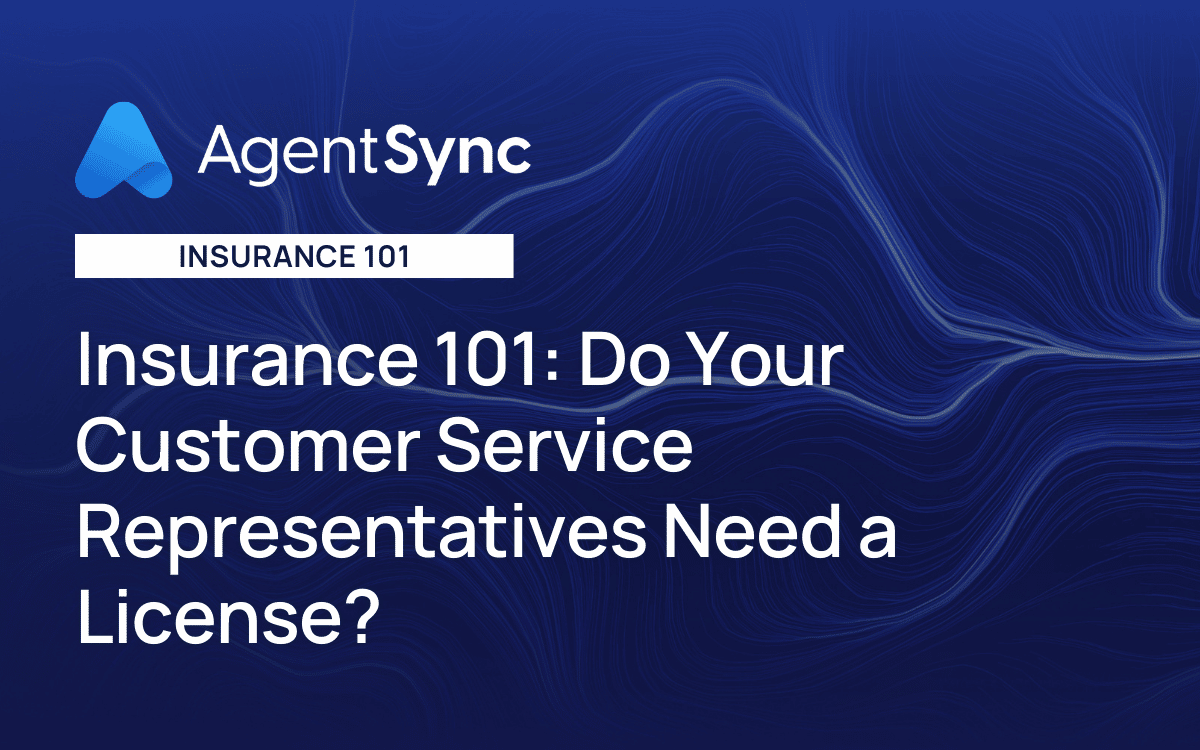Insurance 101: Do Your Customer Service Representatives Need a License?

Customer service representatives working in the insurance industry provide a valuable connection between policyholders and insurance providers. Great customer service is key to an agency, carrier, or MGA/MGU’s success and growth. While having a license is not always a requirement of becoming an insurance customer service representative, agencies with licensed CSRs may find the benefits outweigh the price.
Is having a license a requirement for insurance customer service representatives?
The answer is…it depends. Whether or not a customer service representative needs a license is mainly dependent on what their responsibilities include (which can differ depending on the agency, carrier, or MGA they work for) and specific state regulations.
Some companies require all customer service representatives to carry a license (we’ll get into why later), but being licensed is not necessarily a requirement of being a customer service representative in the insurance industry.
What can an unlicensed customer service representative do?
Without a license, a customer service representative is unable to sell insurance or discuss any specific policy details with clients. So what can they do? An unlicensed customer service representative’s responsibilities are focused mainly on being the connection between a current or prospective customer and an agent.
In other words they mostly perform administrative duties such as directing phone calls and scheduling appointments. However, there are some states that require customer service representatives to hold a license even to perform any administrative services to policyholders.
Additional activities an unlicensed customer service representative can engage in include:
- Dispensing general information about the agency or agent
- Supplying customers with application forms and other new client documents
- Relaying messages to licensed agents regarding current or prospective customer information
- Obtaining additional information from an insured at the request of a licensed agent
- Informing policyholders of their current coverages as indicated in company records
What can a licensed customer service representative do?
If a customer service representative does have a license, their permitted activities expand to include more responsibilities regarding specific customer needs. Of course, a licensed customer service representative is still responsible for the same activities they can perform without a license, but they can also discuss more detailed information with a client such as pricing and coverage gaps.
Additional activities a licensed customer service representative can engage in include:
- Identifying and responding to customer needs or inquiries
- Upselling or cross-selling on existing client policies
- Discussing current coverages and prices with existing clients
- Recommending solutions to client complaints
- Communicating changes or adjustments in individual policies to clients
What are the benefits and advantages of licensed customer service representatives?
1. Optimize communication and improve customer experience
In California, if a client notices a typo in their policy and discloses it to an unlicensed customer service representative, that representative’s hands are pretty much tied. Making a change to a policy could be characterized as transacting insurance, which unlicensed representatives are not legally allowed to do.
In this scenario, to avoid facing any legal consequences, the unlicensed customer service representative would need to ask a licensed producer to correct the error. This negatively impacts the customer’s experience and slows down work for licensed agents who are no doubt dealing with matters more pressing than a typo.
With licensed customer service representatives, communication between an agency and its clients becomes more efficient. Where an unlicensed representative would have to pass a message on, a licensed one may be able to solve the issue without having to escalate to an agent.
2. Ensure compliance
Remember earlier when we mentioned that some companies require all customer service representatives to be licensed? One reason for this is so the agency, carrier, or MGA can avoid the consequences of any employee being caught selling insurance without a valid license. Whether intentional or not, if a customer service representative appears to sell, solicit, or negotiate insurance without a license, they and the company they work for could face large financial or even criminal penalties.
To ensure they remain compliant, some insurance companies have an entire team or department dedicated to ensuring all employees are licensed. Of course, as anyone working in the insurance industry knows, licensing can be quite the hassle. From ever changing regulations to human error, ensuring all employees remain compliant is a challenge only recently becoming easier with the help of insurance licensing software.
3. Enable business growth
If customer service representatives are licensed, they have more opportunities to improve accounts. If a policyholder calls about gaps in their coverage, a licensed representative can discuss additional coverages with current policyholders and have a chance to cross sell or upsell them.
While there’s more expense involved in licensing all customer service representatives, ensuring all employees are knowledgeable and capable of handling customer needs can add value to an agency.
Licensing your customer service representatives is just one way to increase efficiency and reduce compliance errors at your agency, carrier, or MGA/MGU. AgentSync is another. Schedule a demo today to see how AgentSync’s solution can empower your team.
About AgentSync
AgentSync builds modern insurance infrastructure that connects carriers, agencies, MGAs, and producers. With customer-centric design, seamless APIs, automation, and unparalleled service AgentSync’s solutions create onboarding, licensing, and appointing processes insurers and producers love while ensuring growth and compliance never compete. Founded in 2018 by Niranjan “Niji” Sabharwal and Jenn Knight, and headquartered in Denver, Colo., AgentSync has been recognized as one of Denver’s Best Places to Work, as a Forbes Magazine Cloud 100 Rising Star, an Insurtech Insights Future 50 winner, and is ranked 88 in Forbes – America’s 500 Best Startup Employers 2022.

